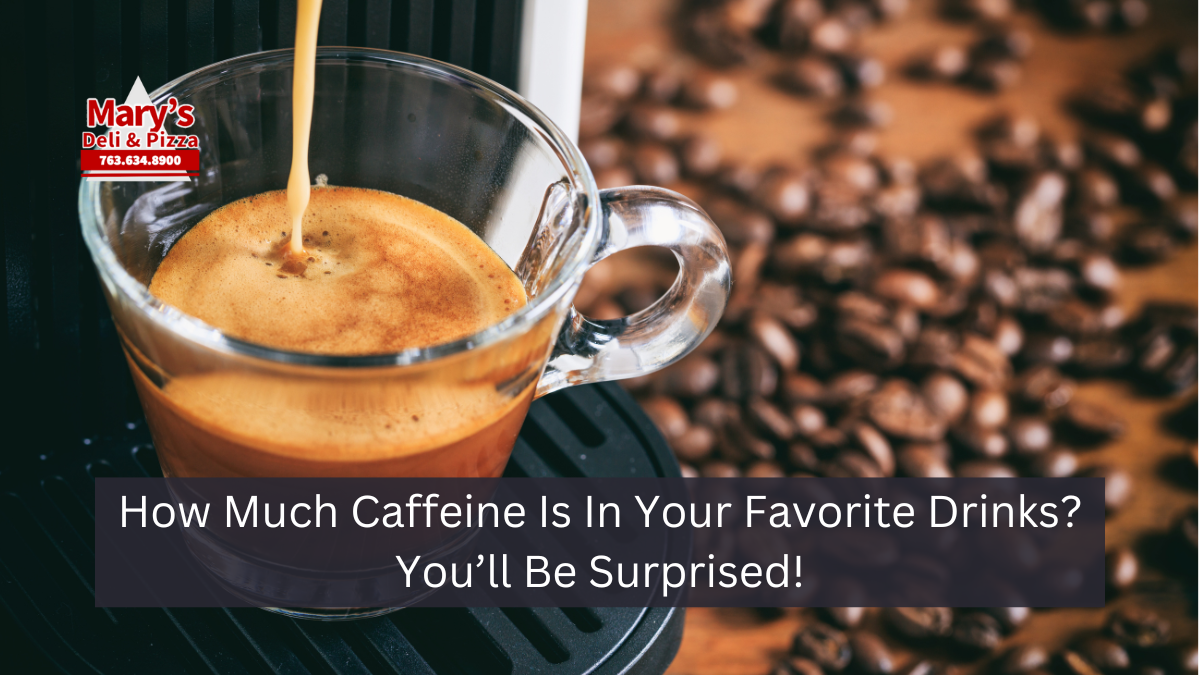Caffeine is a part of everyday life for most people, whether it’s that morning cup of coffee, an energy drink to power through the afternoon, or a soothing cup of tea. But how much caffeine is in those drinks? Knowing your intake is essential to stay within the FDA’s recommended 400 milligrams per day, an amount considered safe for most adults.
Let’s break down the caffeine content of some popular drinks, so you know exactly how much you’re consuming!
Understanding Caffeine Levels In Popular Drinks
Each drink’s caffeine content varies depending on factors like the type of beans or tea leaves used, the brewing method, and serving size. Here’s an overview of common beverages and their average caffeine content for an 8-ounce serving.
1. Coffee
Caffeine Content:
- Standard 8-ounce cup: 95 mg (approx.)
Coffee is one of the most popular sources of caffeine. However, the exact caffeine level depends on the beans and how the coffee is brewed.
Fun Fact: Dark roast coffees often contain less caffeine than lighter roasts, as the roasting process reduces caffeine content.
2. Espresso
Caffeine Content:
- Single shot: 64 mg
- Starbucks Espresso shot: 75 mg
Espresso packs a punch, despite its small size. Typically, a single shot (1-ounce) contains around 64 mg of caffeine, but this varies by coffee shop.
3. Cappuccino
Caffeine Content:
- One shot of espresso: 64–75 mg
- Double shot cappuccino (common size): 128–150 mg
Cappuccinos typically contain one or two shots of espresso. The frothy milk helps temper the bitterness, but it doesn’t reduce the caffeine kick.
4. Latte
Caffeine Content:
- One shot: 64–75 mg
- Double shot latte (standard size): 128–150 mg
Similar to cappuccinos, lattes have a base of espresso and steamed milk, giving them the same caffeine content but a creamier texture.
5. Cold Brew
Caffeine Content:
- 8-ounce serving: 100 mg or more
- Starbucks Cold Brew (16 oz): 205 mg
Cold brew coffee is steeped in cold water for a long time, often resulting in a highly concentrated caffeine brew. Dilution with milk or water affects caffeine levels, but it’s typically stronger than standard iced coffee.
6. Black Tea
Caffeine Content:
- 8-ounce cup: 47 mg
Black tea is a milder source of caffeine than coffee, with a range that can vary depending on the variety and steeping time.
7. Green Tea
Caffeine Content:
- 8-ounce cup: 28 mg
Green tea is even milder than black tea. Its lighter caffeine load makes it a popular choice for those seeking less of a buzz while still benefiting from antioxidants.
8. Energy Drinks
Caffeine Content (8-ounce serving):
- Red Bull: 80 mg
- Monster Energy: 86 mg
- Celsius: 100 mg
- Rockstar: 120 mg
Energy drinks are often consumed for a quick energy boost, but their caffeine levels vary widely. Some contain as much caffeine as a regular cup of coffee, so checking the label is essential!
Table: Caffeine Content In Popular Drinks (Per 8-Ounce Serving)
| Drink | Caffeine Content (mg) |
|---|---|
| Coffee | 95 |
| Espresso | 64-75 (per shot) |
| Cappuccino | 128-150 (double shot) |
| Latte | 128-150 (double shot) |
| Cold Brew Coffee | 100+ |
| Black Tea | 47 |
| Green Tea | 28 |
| Red Bull | 80 |
| Monster Energy | 86 |
| Celsius Energy | 100 |
| Rockstar Energy | 120 |
Conclusion:
Caffeine can be a great pick-me-up, but it’s important to know how much you’re consuming from your favorite drinks. While a regular cup of coffee might seem harmless, it’s easy to surpass the recommended daily limit if you’re having multiple drinks throughout the day. Keep track of your caffeine intake and make adjustments to avoid overconsumption, so you can enjoy the benefits without the jittery side effects!
FAQs
1. What Is The Safe Limit Of Daily Caffeine Consumption?
The FDA recommends up to 400 milligrams of caffeine per day for most adults, which equals roughly four cups of coffee.
2. Is Espresso Stronger Than Coffee?
Espresso contains more caffeine per ounce than regular coffee, but because a serving of espresso is typically smaller, it may have less caffeine overall.
3. How Much Caffeine Is In Decaf Coffee?
Despite its name, decaf coffee isn’t caffeine-free. A cup of decaf contains about 2 to 5 mg of caffeine, depending on the brand and brewing method.
4. Are Energy Drinks More Caffeinated Than Coffee?
It depends. Some energy drinks contain similar levels of caffeine as coffee (around 80-120 mg per 8-ounce serving), but their caffeine can add up quickly with larger serving sizes.
5. Does The Brewing Method Affect Caffeine Content?
Yes, the longer the brewing process (as in cold brew), the more caffeine is typically extracted from the beans, resulting in a stronger drink.

